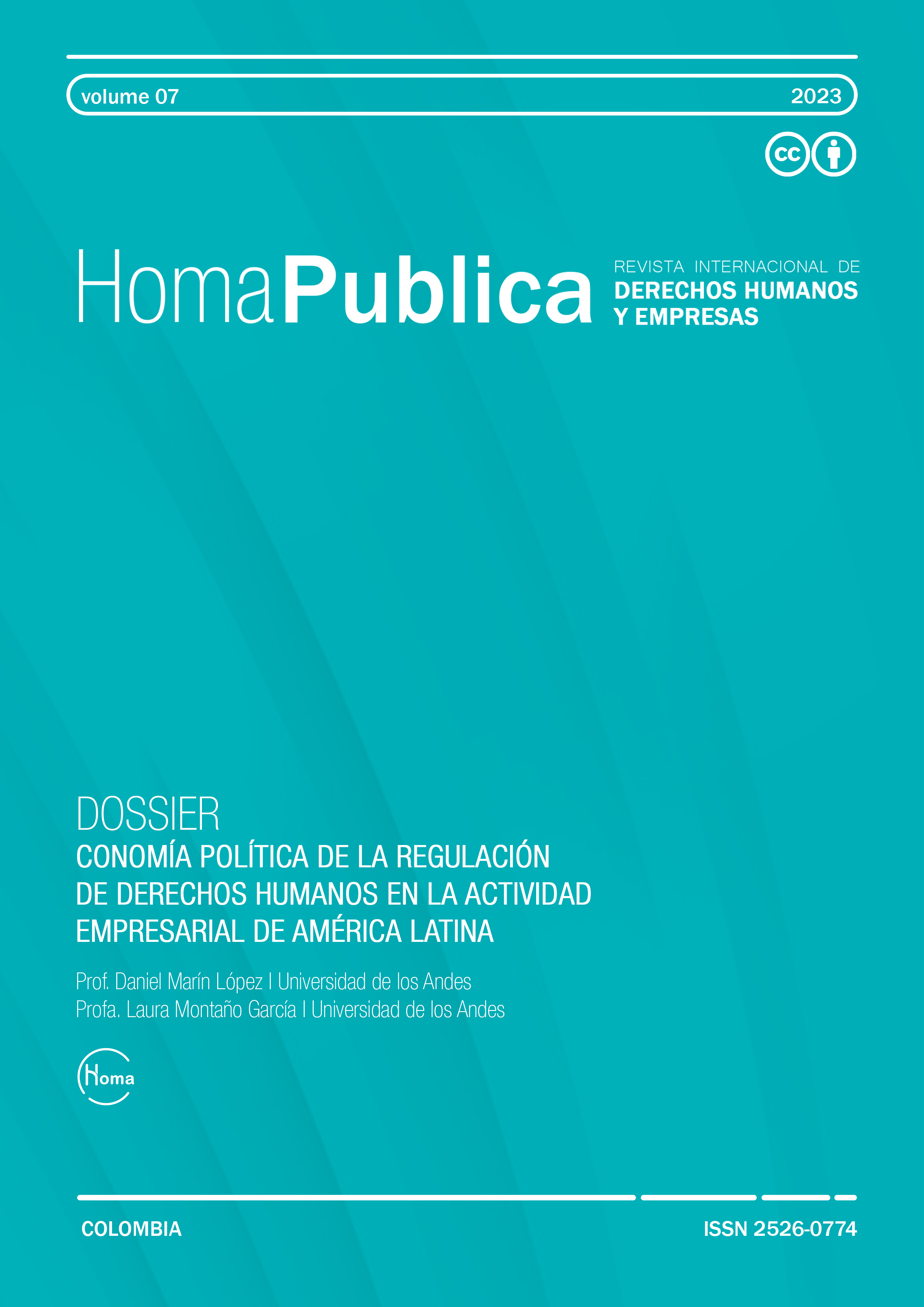an invisible phenomenon: : Land Grabbing as an Economic Crime Against Humanity
Published 2023-12-19
Keywords
- Land Grabbing,
- Crime against humanity. ,
- Core Crimes,
- Business and Human Rights,
- Neoliberalism
- Original acumulation,
- Economic Crimes against Humanity ...More
How to Cite
Copyright (c) 2023 Homa Publica - Revista Internacional de Derechos Humanos y Empresas

This work is licensed under a Creative Commons Attribution 4.0 International License.
Abstract
Based on three case studies (Colombia, South East Asia and Mexico), the article analyzes land grabbing as a phenomenon linked with core crimes; The authors stipulate common characteristics of the phenomenon and propose the stipulation of land grabbing as an Economic Crime Against Humanity. In this task, the authors analyze the statute of the International Criminal Court, highlighting its inability to deal with the phenomenon, especially when it results in serious crimes. Seen from this perspective, the land grabbing is presented as a strategy rather than a tactic carried out by transnational companies that use, among others, crimes against humanity to carry out the land grab.
Downloads
References
- Alá, B. e. (2014). La economía política del desarrollo en América Latina. Ciudad de México: Fondo de Cultura Económica.
- Alá, B. e. (2014). El problema del desarrollo en América Latina. Ciudad de México: Fondo de Cultura Económica.
- Albarello, G. (2021). The Role of the World Bank in the Bretton Woods System. Journal of International Money and Finance, 126, 102510.
- Arenillas, L. (2020). Delitos económicos contra la humanidad: un reto jurídico para la regulación positiva de los delitos contra la humanidad en el artículo 7 del Estatuto de Roma. SYbIL, 241, 271-292.
- Atienza, M. (2014). Filosofía del Derecho para el mundo latino. Otra Vuelta De Tuerca. DOXA, Cuadernos de Filosofía del Derecho, 37(1), 300-318.
- Braun-Meizendick, V. (2009). El papel de los bancos en el desarrollo. Nueva York: Naciones Unidas.
- Carrasco, C. M. (2014). España y la implementación de los principios rectores de las Naciones Unidas sobre empresas y derechos humanos: oportunidades y desafíos. En M. D. C. A. del Castillo (Ed.), Derechos humanos en las relaciones empresa-Estado (pp. 21-38). Madrid: Huygens.
- Comisión de la Verdad. (2021). Despojo y memoria de la tierra. WQeb Comisión de la Verdad, https://web.comisiondelaverdad.co/actualidad/noticias/despojo-y-memoria-de-la- tierra#:~:text=El%20t%C3%A9rmino%20despojo%20agrupa%20las,el%20entramad
- López, B. (2015). Derechos Humanos Empresas Trasnacionales y Responsabilidad Social Empresal. Bogotá-Otzenhausen-Madrid: Berg Institute, Derechos Humanos.
- Marant, A. (Director). (2010). Planeta en venta. ARTE TV.
- Marín, Z. P. (2020).
- Marx, K. (1974). El Capital, Tomo i, capítulo XXIV. Moscú: Progreso, Marxists Internet Archive, 2002.
- Mason, E. S., & Asher, R. E. (1973). The World Bank since Bretton Woods. Washington D.C.: The Brookings Institution.
- Need-Siphat, W. (2012).
- NGOF. (2011).
- PARES, Á. (2019).
- Ramírez, Á. (s.f.).
- Roig, R. D. (1995). Jueces y normas. La decisión judicial desde el ordenamiento. Prólogo de Gregorio Peces-Barba. Madrid: Marcial Pons, Ediciones Jurídicas S.
- Roux, M. (2012).
- Rulli, S. (2013). p. 2.
- Stoler, A. L. (s.f.). 1995.
- Stoler, A. L. (1995). Race and the Education of Desire: Foucault's History of Sexuality and the Colonial Order of Things. Durham, NC: Duke University Press.
- UNCDF. (2010). The Power of Microfinance: A Review of Recent Evidence. New York: United Nations Capital Development Fund.
- Stoler. (1995).
- UNCDF. (2010).

